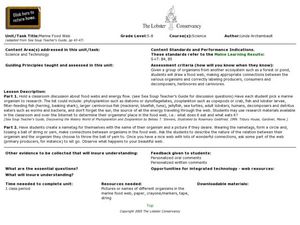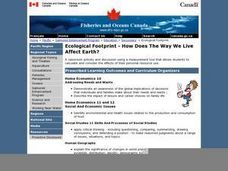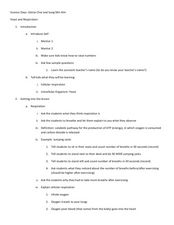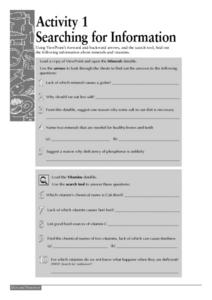California Academy of Science
Rapid Brainstorming: How Can We Improve Our Global Food System?
In 2018, the average fast food burger cost $2.64 while a salad averaged $4.14. Does the price difference matter to public health? Scholars consider that question and others in a brainstorming session about improving our global food...
Curated OER
Marine Food Web
Students investigate the effects of the food chain on all animals by creating a food web. In this seafood lesson, students discuss energy flow and research a specific marine organism of their choice. Students create a food web in their...
Chicago Botanic Garden
Nature Walk and Ecosystem Introduction
A food web has no organism higher than a tertiary consumer because there wouldn't be enough energy left to sustain them. The fourth installment in a seven-part series begins with a nature walk to get pupils thinking about their...
Curated OER
Step by Step
Learners explore agriculture by creating a food production diagram. In this farming instructional activity, students read assigned text about the entities that assist in food production companies such as farmers, truckers and...
Curated OER
Ecological Footprint--How Does The Way We Live Affect Earth?
Students demonstrate an awareness of the global implications of decisions that individuals and families make about their needs and wants. They identify environmental and health issues related to the production and consumption of food....
NOAA
Deep-Sea Ecosystems – Life is Weird!
A pool of brine in the deep sea can be up to four times as salty as the surrounding sea water. The deep sea ecosystem relies on chemosynthesis and the organisms that live there are often strange to us. The lesson focuses on researching...
Curated OER
Pass the Jug
Students discuss water rights. In this science lesson, students simulate an exercise whereby they begin to understand the meaning of water allocation and limited water supplies by actually passing out water from a jug.
Curated OER
Ecological Relationships
Students identify ecological elements and their factors on species, populations and food webs. They analyze ecosystems for these elements and research how these factors influence species survival rate. Predictions on conditions over time...
Curated OER
WHY WE AREN'T FILTER FEEDERS
Students describe three methods of obtaining food: scavenging, filter feeding, and hunting. They describe three methods of obtaining food: scavenging, filter feeding, hunting, and list at least two reasons why humans are not considered...
Curated OER
Yeast and Respiration
Students explore oxygen properties by conducting a cell experiment in class. For this respiration lesson, students discuss the process of breathing and how oxygen is inhaled before carbon dioxide is exhaled. Students utilize yeast,...
Curated OER
Searching for Information
In this computer worksheet, young scholars use ViewPoint's forward and backward arrows, and the search tool to locate information given about minerals and vitamins. They load the Vitamins datafile and use the search tool to respond to...
Curated OER
Ecology of the Savanna-Forest Boundaries in Central Brazil
Learners explore photosynthesis. In this photosynthesis lesson, students label parts of photosynthesis and take notes. Learners conduct experiments on leaves, make observations and record their findings.
Curated OER
Marshland Ecosystem
Students classify animals based on their physical characteristics and eating habits. In this animal identification lesson plan, students investigate the life forms shown on a Parisian ceramic basin, and discover ecosystem the artist was...
Curated OER
Fossil Fuels-Importance and Formation
Student is introduced to the concept of energy as a common factor among all things. They list three fossil fuels and describe how fossil fuels were formed. They then tell how much plant debris it took to form one foot of coal.
Curated OER
Minerals and You
Students study how mineral are used in everything around us-- from cereal to satellites. After informing the students about minerals they will discuss the ones that are in the area of the students.
Curated OER
Wilderness Training
Pupils explore how to prepare for a wilderness journey. In this wilderness survival lesson, students construct a compass from a magnet and a sewing needle.
Curated OER
Microorganism Multiplication
Seventh graders complete two experiments to learn about harmful and helpful microorganisms. In this microorganisms lesson, 7th graders read background information about fungi, yeast, and club fungi. Students then complete two experiments...
Curated OER
Uses of Coal
Young scholars be aware of the products made possible by coal by studying about the four major markets of coal: electric utilities, industrial/retail users, the steel industry and exports.
Curated OER
Mussel Movements
Students consider the impact of invasive species on local environments. In this ecology lesson, watch the video, Arizona Wildlife Views, which focuses on invasive species. Students develop vocabulary, relate to meaningful comprehension...




















